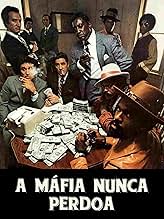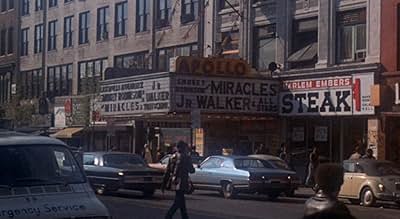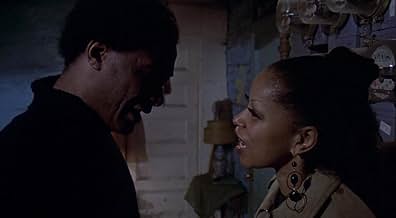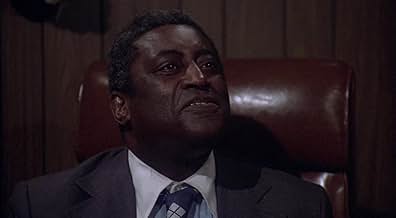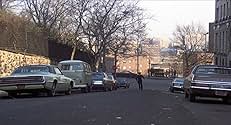NOTE IMDb
7,0/10
7,8 k
MA NOTE
Deux flics de New York s'en prennent à des escrocs amateurs qui tentent d'arnaquer la mafia et de déclencher une guerre des gangs.Deux flics de New York s'en prennent à des escrocs amateurs qui tentent d'arnaquer la mafia et de déclencher une guerre des gangs.Deux flics de New York s'en prennent à des escrocs amateurs qui tentent d'arnaquer la mafia et de déclencher une guerre des gangs.
- Réalisation
- Scénario
- Casting principal
Joseph Attles
- Mr. Jessup
- (as Joe Attles)
Anthony C. Cannon
- Sal
- (as Anthony Cannon)
George DiCenzo
- Patrolman
- (as George Di Cenzo)
Avis à la une
I caught this on BBC 1 one night many years ago . I forgot the title but could vividly remember a number of scenes especially a line of dialogue where two characters describe a third one having his genitals mutilated . This type of movie would be broadcast on television 30 years ago and no one would blink an eyelid but at the same time you can understand why it wouldn't be shown on network TV today . It as also a sign of the times back then that the TV broadcast had the F word overdubbed to something less offensive but the racial slurs against both black and whites remained intact . Perhaps the fact this film is consciously insensitive and hard hitting works against it ? This is a pity because it's not some " Blaxploitation " fare but more of a New Hollywood thriller at its best
The story itself is no great shakes - a couple of black dudes rip off and kill a few members of the Mafia and the black underworld and also kill a couple of uniformed cops in the process and find if not the entire world against them then at least the law enforcers and law breakers of NYC wanting to cap their ass . It's the sort of film Tarantino has been inspired by but unlike Tarantino's work this movie is devoid of post modernism and crippling self indulgence and is a relatively tightly plotted screenplay where lots of nasty things happen to lots of nasty people . There's a subplot featuring character interaction between Anthony Quinn's nasty racist white cop and Yaphet Kotto's not very nasty by the books black cop that might have been clichéd but does seem fresh and realistic , probably down to the fact the performances and writing portraying a rather amoral relationship between the two men and the wider world . And this does feel like an exceptionally amoral film that we never see nowadays more is the pity
The story itself is no great shakes - a couple of black dudes rip off and kill a few members of the Mafia and the black underworld and also kill a couple of uniformed cops in the process and find if not the entire world against them then at least the law enforcers and law breakers of NYC wanting to cap their ass . It's the sort of film Tarantino has been inspired by but unlike Tarantino's work this movie is devoid of post modernism and crippling self indulgence and is a relatively tightly plotted screenplay where lots of nasty things happen to lots of nasty people . There's a subplot featuring character interaction between Anthony Quinn's nasty racist white cop and Yaphet Kotto's not very nasty by the books black cop that might have been clichéd but does seem fresh and realistic , probably down to the fact the performances and writing portraying a rather amoral relationship between the two men and the wider world . And this does feel like an exceptionally amoral film that we never see nowadays more is the pity
"Across 110th Street" was more than just a cliché (yet it was full of them), it was deep and developed (yet had a simplistic story about cops and criminals), it was gritty and honest (yet overly-so enough to make you gasp, not laugh), and it was pure, uncut, cinematic genius from beginning to the wildly unseen ending. There were plenty of pitfalls for "Across 110th Street" to fall into, but it continually saved itself by being genuine and dark throughout. While the editing, albeit pure 70s cinema, was completely tangent, the film itself demonstrated the raw force of truth, giving us a rare (yet fictional) story of the changing of the guard in Harlem, the truth of its streets, and the minds of its criminals.
Sounding like a scene right out of "Dead Presidents", our story begins with three African Americans stealing money from the mob, only to transform the simple robbery into a battleground, equipped with machine gun fire and plenty of cops caught in the line of fire. Needless to say, both sides the Italian mob who currently has a strong hold on the crime in Harlem as well as both the upcoming African American police Lieutenant (played by Yaphet Kotto) and the decaying corrupt Captain (played by Anthony Quinn) are ready to do whatever it takes to bring these men to justice. Our plot device suddenly becomes a ticking clock, with our minds in constant question as to who is going to get to the finish line first. What keeps this cliché device from sounding stale is director Barry Shear's ability to take us through each of the three story lines with nobody eating from the sweet cake of victory at any given time. "Across 110th Street" is not a comfortable story. The characters are flawed, the imagery is sandpaper rough, and the language is honest. Shear has made this film during a time where corruption is used to represent the mindset of the community. Harlem is not shown in a productive light, but then neither is the police nor the mob. What makes "Across 110th Street" feel like a science experiment is that you see the decay of the community implode systematically. From the simple thugs who begin the robbery, to the Italian mob who is just as brutal but with better suits, all the way to the police who use the same tactics, but are protected (supposedly) by a badge, this film explores the explosion of corruption in a bold new way that eliminates cliché, yet builds on honesty.
Shear's ability to build the story into the camera's frame is only the stepping stone of this film. The unrelenting ending could only have occurred with the power of the actors in front of the camera. Their work is simple, at times one could even call it amateurish, but Quinn and Kotto do a phenomenal job of keeping the story, and their characters, grounded at all times. Their beats could have been tightened, but their flaws build upon the chaos of this story. Their facial expressions alone are worth their weight in gold, especially Quinn's ending glare. As Quinn and Kotto were our leads for this film, what stands out is how similar they are to their flawed mobsters and criminals. With our lead mobsters racism coupled with our medial issues of our criminals, we see a blend between them all. While they are all different characters, Shear brings them all together with small similarities. For someone jumping into the middle of this film, one would have trouble guessing who were the "real" bad guys, the guys with the guns or the guys with the badges. That is the next layer of "Across 110th Street" that could be used in any film studies class across the nation. Not just the visuals of a time filled with racial disgust, but also the fact that the racial divide wasn't in just black and white. Harlem owns the police, yet they are there to uphold the law while perhaps not exactly like that in Harlem today one can see this happening throughout the world in modern society.
Finally, one cannot end a review of "Across 110th Street" without mentioning the music which was icing on the hypothetical cake. To me, the sounds captured the era, the chaos of the music coupled well with the violence happening on screen. The two blended perfectly together, giving us not just a taste of an explosive Harlem, but also the sounds that may have accompanied it. As a child of the 80s, I never was witness to this so to see it (albeit in a form of fiction) only helped to heighten the awareness of this era in NYC.
Overall, "Across 110th Street" was a violent, loud, and turbulent film that was laced with clichés that were forgotten by the next scene. One could easily watch this film on late-night television and never quite see the power behind Shear's camera, or Quinn's acting ability (that final scene still haunts me), or the challenging music that accompanied our visuals, but watching it on a bright and sunny Saturday, the excellence of this film comes full force. The acting was at a perfect pitch for this film, the corruption that Shear demonstrates from across three spectrums adds a level of honesty to a film that could have easily been lost by another director. "Across 110th Street" reminded me of early Scorsese work, the raw grittiness of the city, a city that Shear loved (he filmed in Harlem), coupled with the powerful imagery took me to "Mean Streets" and "Goodfellas", but not "The Departed". This is a cannon of a film, one that should be watched and retained for the sheer honesty of the work, while it is fiction it holds a bit of truth to the turbulence of the world.
Grade: ***** out of *****
Sounding like a scene right out of "Dead Presidents", our story begins with three African Americans stealing money from the mob, only to transform the simple robbery into a battleground, equipped with machine gun fire and plenty of cops caught in the line of fire. Needless to say, both sides the Italian mob who currently has a strong hold on the crime in Harlem as well as both the upcoming African American police Lieutenant (played by Yaphet Kotto) and the decaying corrupt Captain (played by Anthony Quinn) are ready to do whatever it takes to bring these men to justice. Our plot device suddenly becomes a ticking clock, with our minds in constant question as to who is going to get to the finish line first. What keeps this cliché device from sounding stale is director Barry Shear's ability to take us through each of the three story lines with nobody eating from the sweet cake of victory at any given time. "Across 110th Street" is not a comfortable story. The characters are flawed, the imagery is sandpaper rough, and the language is honest. Shear has made this film during a time where corruption is used to represent the mindset of the community. Harlem is not shown in a productive light, but then neither is the police nor the mob. What makes "Across 110th Street" feel like a science experiment is that you see the decay of the community implode systematically. From the simple thugs who begin the robbery, to the Italian mob who is just as brutal but with better suits, all the way to the police who use the same tactics, but are protected (supposedly) by a badge, this film explores the explosion of corruption in a bold new way that eliminates cliché, yet builds on honesty.
Shear's ability to build the story into the camera's frame is only the stepping stone of this film. The unrelenting ending could only have occurred with the power of the actors in front of the camera. Their work is simple, at times one could even call it amateurish, but Quinn and Kotto do a phenomenal job of keeping the story, and their characters, grounded at all times. Their beats could have been tightened, but their flaws build upon the chaos of this story. Their facial expressions alone are worth their weight in gold, especially Quinn's ending glare. As Quinn and Kotto were our leads for this film, what stands out is how similar they are to their flawed mobsters and criminals. With our lead mobsters racism coupled with our medial issues of our criminals, we see a blend between them all. While they are all different characters, Shear brings them all together with small similarities. For someone jumping into the middle of this film, one would have trouble guessing who were the "real" bad guys, the guys with the guns or the guys with the badges. That is the next layer of "Across 110th Street" that could be used in any film studies class across the nation. Not just the visuals of a time filled with racial disgust, but also the fact that the racial divide wasn't in just black and white. Harlem owns the police, yet they are there to uphold the law while perhaps not exactly like that in Harlem today one can see this happening throughout the world in modern society.
Finally, one cannot end a review of "Across 110th Street" without mentioning the music which was icing on the hypothetical cake. To me, the sounds captured the era, the chaos of the music coupled well with the violence happening on screen. The two blended perfectly together, giving us not just a taste of an explosive Harlem, but also the sounds that may have accompanied it. As a child of the 80s, I never was witness to this so to see it (albeit in a form of fiction) only helped to heighten the awareness of this era in NYC.
Overall, "Across 110th Street" was a violent, loud, and turbulent film that was laced with clichés that were forgotten by the next scene. One could easily watch this film on late-night television and never quite see the power behind Shear's camera, or Quinn's acting ability (that final scene still haunts me), or the challenging music that accompanied our visuals, but watching it on a bright and sunny Saturday, the excellence of this film comes full force. The acting was at a perfect pitch for this film, the corruption that Shear demonstrates from across three spectrums adds a level of honesty to a film that could have easily been lost by another director. "Across 110th Street" reminded me of early Scorsese work, the raw grittiness of the city, a city that Shear loved (he filmed in Harlem), coupled with the powerful imagery took me to "Mean Streets" and "Goodfellas", but not "The Departed". This is a cannon of a film, one that should be watched and retained for the sheer honesty of the work, while it is fiction it holds a bit of truth to the turbulence of the world.
Grade: ***** out of *****
While not truly "blaxploitation", the integrated cast is of major interest in this story (based on a novel by Wally Ferris) strongly and memorably depicting racial differences. Two detectives, a veteran Italian-American named Mattelli (Anthony Quinn) and an up and coming black, Lt. Pope (Yaphet Kotto), are forced to work together while investigating the case of three black men (two of them disguised as cops) who ripped off money from a Mafia controlled bank. Now it's up to Mattelli and Pope to find the three men before the Mafia is able to get their revenge.
There's some wonderful acting in this tough and gritty film, given straightforward treatment by director Barry Shear and featuring plenty of authentic Harlem locations. It's got quite a lot of hard hitting violence, and may be uncomfortable to watch at times for some viewers. The music by J.J. Johnson is superb and there are also great songs by Bobby Womack on the soundtrack. There's one ingenious cut a little past the 77 minute mark. The pacing is quite effective and the storytelling always interesting and compelling.
Quinn is solid as the old school, bigoted veteran and Kotto is his match as the more disciplined, efficient younger man. Anthony Franciosa is fun in a key supporting role as a mob henchman, and the cast is peppered with many familiar faces. Delivering standout performances are the raspy voiced Richard Ward as gangster Doc Johnson and Paul Benjamin as determined career criminal Jim Harris. Viewers will enjoy themselves spotting actors and actresses such as George DiCenzo, Antonio Fargas, Paul Harris, Gloria Hendry, Gilbert Lewis, Charles McGregor, Robert Sacchi, Marlene Warfield, Mel Winkler, and Burt Young.
Overall this is potent entertainment and deserves its place among the great NYC-based films of the 1970s.
Quinn and Shear were the executive producers.
Eight out of 10.
There's some wonderful acting in this tough and gritty film, given straightforward treatment by director Barry Shear and featuring plenty of authentic Harlem locations. It's got quite a lot of hard hitting violence, and may be uncomfortable to watch at times for some viewers. The music by J.J. Johnson is superb and there are also great songs by Bobby Womack on the soundtrack. There's one ingenious cut a little past the 77 minute mark. The pacing is quite effective and the storytelling always interesting and compelling.
Quinn is solid as the old school, bigoted veteran and Kotto is his match as the more disciplined, efficient younger man. Anthony Franciosa is fun in a key supporting role as a mob henchman, and the cast is peppered with many familiar faces. Delivering standout performances are the raspy voiced Richard Ward as gangster Doc Johnson and Paul Benjamin as determined career criminal Jim Harris. Viewers will enjoy themselves spotting actors and actresses such as George DiCenzo, Antonio Fargas, Paul Harris, Gloria Hendry, Gilbert Lewis, Charles McGregor, Robert Sacchi, Marlene Warfield, Mel Winkler, and Burt Young.
Overall this is potent entertainment and deserves its place among the great NYC-based films of the 1970s.
Quinn and Shear were the executive producers.
Eight out of 10.
This movie sweats. Early on in the mostly pandering "blacksplotation" film cycle of the seventies, came this incredibly violent, hate filled drama of three small time crooks who stumble on a big score and their hopeless attempt to survive it. The film is utterly dark and features nary a cheap shot or moment of easy cynicism.
In one scene Anthony Quinn and Yaphet Kotto go to the apartment of one of the crooks lovers, already slain, to look for information and break the news. This is one of the most heartbreaking scenes ever put on film, a model of restraint and economy in a film that is busting at the seams. Actors who were probably barely in another movie give magnificent performances. The neglected Kotto was never better.
A very disturbing film that demands to be seen; art.
In one scene Anthony Quinn and Yaphet Kotto go to the apartment of one of the crooks lovers, already slain, to look for information and break the news. This is one of the most heartbreaking scenes ever put on film, a model of restraint and economy in a film that is busting at the seams. Actors who were probably barely in another movie give magnificent performances. The neglected Kotto was never better.
A very disturbing film that demands to be seen; art.
Unlike in most reviews there are to find on "Across 110th Street", I will try not to participate in the debate about whether or not the film classifies as a genuine Blaxploitation effort. I will, however, elaborate as much as I can on all the things that "Across 110th" does represent
and that is quite a lot! This is a bona fide gritty, vile, uncompromising and unceasingly violent action-thriller from the glorious early 70's. It's a hardcore-to-the-bone tale of corruptness and survival with solid acting performances and a tight screenplay, yet without pushy morality lessons or unnecessary sentimental interludes. "Across 110th Street" is arguably the best Blacks Vs Italians thriller ever made, and this intervened with a strong story about two completely unmatchable cops that are forced to work together results in an unimaginably powerful and unforgettable movie; albeit one that only can be enjoyed by people with strong stomachs and nerves of steel as the bloodshed is relentless and the level of suspense is unremitting. Petty thief Jim Harris and his two accomplices decide to steal a large sum of money from the Italian Mafiosi that are running the show in Harlem. The heist goes terribly wrong, though, and Harris kills no less than five gangsters and two police officers. The Italians send their most lethal psychopath to Harlem and the black gangster community organizes their own manhunt as well. Meanwhile the police force deals with internal racial issues. The aging and corrupt but veteran Captain Mattelli is forced to hand over the investigation to Lieutenant Pope, who's fresh out of university and still full of ideals. This is one of the grittiest and frighteningly realistic depictions of the crime-infested New York City district during the early 70's. There are hardly any amiable characters in the entire film, the ambiance is constantly on the verge of depressing and the downbeat ending comes a massive slap in the face. The racial tension between the "main" police officer characters is always present and noticeable, yet moral values and speeches are never shoved down the viewers' throats. The performances are incredible, particularly Anthony Franciosa as the crazed mafia killer and Paul Benjamin as the small thief turned murderer. But the utmost respect is for Anthony Quinn, for courageously illustrating a dismal and raw cop-character with his status in Hollywood. The soul soundtrack is amazing and the actual Harlem filming locations make the film all the more authentic. Barry Shear's direction is surefooted and tight, and I can't believe I haven't checked out some of his other work yet. I still have a copy of "The Todd Killings" lying around, so I hope it's as masterful as this film!
Le saviez-vous
- AnecdotesAlthough known primarily as a "blaxploitation" film, it holds many Neo Noir elements including police procedural (including Anthony Quinn as a slightly crooked cop with a good heart); poor sympathetic criminals stealing from unsympathetic rich criminals; and different factions of the mob and/or gangs.
- GaffesShortly into the movie while counting the money, two cops knock on the door. The tablecloth with the money is folded up and pushed to the floor. When the cops enter the room the tablecloth, money and briefcase are back on the table.
- Versions alternativesThe original UK cinema version was cut by the BBFC with edits made to nearly all the fight scenes and shots of beatings, and heavy cuts to shootings and a man on fire during the climax. All later releases were uncut.
- ConnexionsFeatured in Inside 'Live and Let Die' (1999)
Meilleurs choix
Connectez-vous pour évaluer et suivre la liste de favoris afin de recevoir des recommandations personnalisées
- How long is Across 110th Street?Alimenté par Alexa
Détails
- Date de sortie
- Pays d’origine
- Langues
- Aussi connu sous le nom de
- Pánico en la calle 110
- Lieux de tournage
- Société de production
- Voir plus de crédits d'entreprise sur IMDbPro
Box-office
- Montant brut aux États-Unis et au Canada
- 3 601 306 $US
- Montant brut mondial
- 10 000 000 $US
Contribuer à cette page
Suggérer une modification ou ajouter du contenu manquant

Lacune principale
By what name was Meurtres dans la 110e Rue (1972) officially released in India in English?
Répondre

